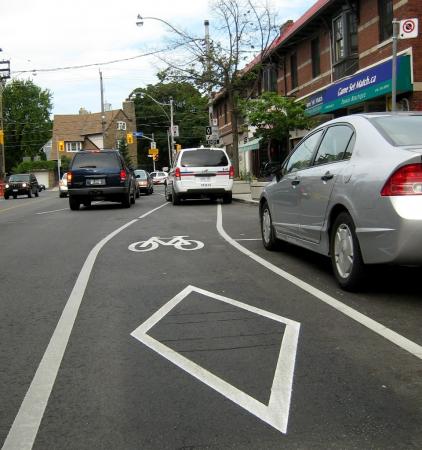Wayne Scott, ex-courier and ex-cycling ambassador, fought and won an eighteen year battle with Revenue Canada over counting courier food as tax deductible fuel. Now he is taking on the City of Toronto to have the Ontario Labour Relations Board to declare Toronto's city streets as safety hazards. Since the same employer that employed him as a Cycling Ambassador in 2005 is also responsible for the state of our streets, Scott figured he had a good case. I worked alongside Scott in 2005 and can attest to the hot, muggy, polluted summer with traffic jams - just like most Toronto summers. I hope Scott can make a difference in improving safety or at embarrass us all at the poor quality of our streets, though its more immediate result may be the City becoming much more careful about the skill level and safety equipment that employees are required to have. The alternative may just be too politically difficult at this time.
On Monday, city officials said they didn't know how many employees use bikes on the job, but police, EMS workers and bylaw officers are among those who cycle on duty.
They run the same risk as any cyclist or bike courier of having a car door opened suddenly in their path or being hit at an intersection. That's because the rules of the road are poorly enforced and the city is years behind on completing its own bike plan, contends Scott, who retired from the courier business about four years ago.
The fact he has worked for the city himself – as a cycling ambassador during the summer of 2005 – doesn't affect the legitimacy of his argument, he said.
"The city and everyone tells us we should be biking, but that's all they do – they tell us to do it and then they toss us out in the meat grinder of the system they have in place," Scott said.
City employees would be unlikely to challenge their employer at the labour board, said environmental lawyer Albert Koehl, who will represent Scott at a pre-hearing settlement meeting at the labour board Tuesday.
"If the city were actually doing what it says it wants to be doing, which is making cycling more accessible to people, then we wouldn't be here. But it seems quite clear to us that the city is not even doing the things they've talked about doing," said Koehl.
The city's 2001 bike plan called for 500 kilometres of bike lanes by 2011. With only 112 kilometres in place, the deadline is now 2012.
The lack of infrastructure and safety means the city isn't benefiting from opportunities it could grasp if more city workers were encouraged to bike – everyone from parking enforcement officers to executives who travel downtown to meetings, Koehl said.
"Think about a construction worker on Bloor St.: There are signs, barriers, police officers. All of that is to protect vulnerable workers from cars. The same thing when you have cyclists – cars might have fender benders, cyclists have body benders," he said.

